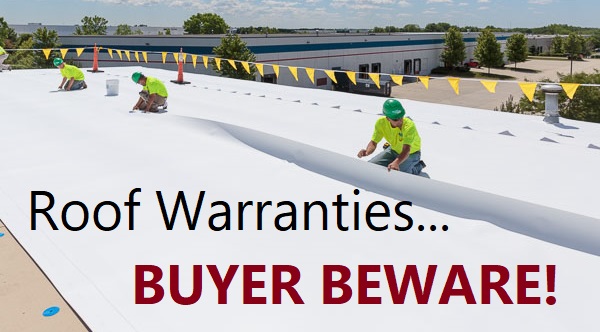Buyer Beware - Understanding Total System Warranties
Not all low-slope warranties are the same!

November 1, 2021 – An issue that that has surfaced more and more often the past couple of years in Colorado's low-slope market and needs to be addressed is that of using warranties as a marketing/sales tool - but not all warranties are the same.
Building owners, property managers and General Contractors are getting “hood-winked” into believing they are contracting with an experienced, established and most of all, a manufacturer’s certified roofing applicator who can provide a Total System NDL Warranty for their new roof.
What roof warranties are available?
There are two types of warranties: material only or total system warranties.
Material only is how it sounds - it only covers material that has failed. It does not cover the labor to remove or install that material or the accessories, fasteners, or counter flashings, etc. This warranty does not cover or cost to repair roof leaks. The cost of this warranty is generally included in the cost to purchase the material or carries a minimal charge. With testing currently done by manufacturers, material failures are very rare. This warranty is available to the purchaser of the roofing material, such as roofing contractors, DIY contractors, homeowners, building owners, etc. Proof of purchase may be required.
A Total System Warranty - often referred to as NDL (No Dollar Limit). An NDL warranty covers all the material supplied by the manufacturer and the contractor’s labor/workmanship. These warranties may provide a no dollar limit for labor and material to fix roof leaks or warranty covered repairs. Total system roof warranty offerings vary from 5 to 30 years, depending on the roof membrane, specific system installed and the manufacturer’s offering. There is a fee for this type of warranty. This warranty will generally include coverage for the membrane, insulation, accessories and edge metal. For this type of warranty, manufacturers each have their own authorized applicator training and credentialing. To receive this warranty, an authorized contractor MUST install the roof system with ALL products being supplied by the manufacturer providing the warranty per the manufacturer’s installation guidelines.
Licensing/Authorized Applicator Credentialing
Installing an effective roofing system is an important investment—one that is not to be approached half-heartedly. How well the installation is performed plays an equally important role in the durability and efficiency of an applied roofing system.
BEFORE signing a contract with the roofing contractor, it is important to understand the warranties available, their differences and be comfortable with the one you choose. If you want a total system warranty, it is a BEST PRACTICE to obtain an Authorized Applicator letter from your contractor that is on the manufacturer’s company letterhead and dated within the same month the project is bidding or awarded.
>>> Every major manufacturer provides these letters to their certified contractors and it’s a great way to verify if the roofer is telling the truth.
Educate yourselves!
It is easy for the average person to get confused when trying to understand the difference between a roofing contractor having a license or having a credential. In practice, roofing contractors can be both licensed and credentialed, but licensing and credentialing are not synonymous.
Licensing
Licensing refers to the process of obtaining permission from relevant authorities to practice or undertake projects within a geographic area, usually a city, township or county. Colorado does not have a statewide license for roofers.
Authorized Applicator Credentials
Credentialing refers to obtaining credentials or certificates from reputable issuing bodies (often manufacturers). These credentials/certificates are given to roofing contractors or companies pursuant to actions such as inspection of past completed projects and/or successful completion of specialized training courses or programs. Credentialing is a statement that attests to the knowledge and expertise of a roofing contractor or company.
Simply put, licensing indicates “permission,” and credentialing represents “competency.”
